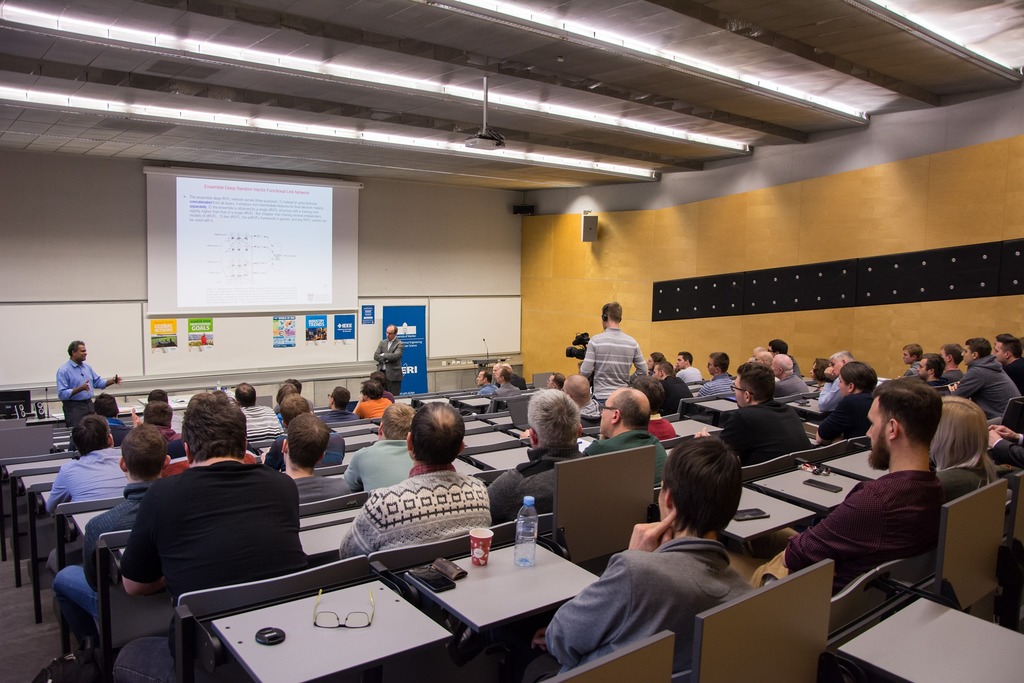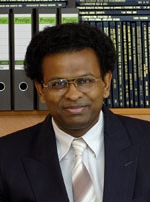Randomization-Based Deep and Shallow Neural Networks

Distinguished Lecturers Program (DLP)
Speaker: DLP 19-15 P. N. Suganthan
Date: January 27, 2020
Location: Maribor, Slovenia
Chapter: IEEE Slovenia Section (Ales Zamuda)
Title of Talks: Randomization-Based Deep and Shallow Neural Networks
Click here for list of current IEEE CIS DLP Talks
Slides from the lecture are available at: Randomized Deep-Shallow-ANN
Photos: https://www.facebook.com/IEEESloveniaCIS/photos/
Video filming of the lecture: https://www.facebook.com/events/186758829390381/permalink/198935101506087/
ABSTRACT (DLP TALK)
This talk will first introduce the main randomization-based feedforward neural networks with closed-form solutions. The popular instantiation of the feedforward type called random vector functional link neural network (RVFL) originated in early 1990s. RVFL variants will be empirically evaluated. Subsequently, deep versions of RVFL will be presented as a single and ensemble classifiers. The talk will also present extensive benchmarking studies using classification and forecasting datasets. If time permits, oblique random forest and kernel ridge regression will also be briefly discussed.
Acknowledgement: Sponsored by the Computational Intelligence Society under its Distinguished Lecturer Program. Prof. Suganthan is a CIS Distinguished Lecturer.
About DLP (Distinguished Lecturers Programs):
The IEEE CIS Distinguished Lecturer Program (DLP) aims at serving the Computational Intelligence community by providing stimulating lectures given by distinguished IEEE CIS professionals and scholars. It also aims at helping young researchers (masters and doctoral students) providing suggestions/guidance on their research problems as well as promoting computational intelligence tools and techniques among undergraduate students to make them interested in CIS fields of interest. Distinguished Lecturers present novel basic and/or applied research results in their CIS sub-field. Their lectures offer insights into the trends and challenges of their CIS sub-field and their vision for the given sub-field. In any given year, selected IEEE CIS Distinguished Lecturers (DLs) have a balanced representation of CIS sub-fields and include representatives from academia, industry and government while spanning different IEEE regions.The program supports local CIS Chapters by enabling a major chapter event which can considerably improve a chapter’s visibility to their existing IEEE CIS members, other IEEE society members and the wider CIS community in their area. It is expected that DLP events actively seek to recruit new CIS professionals to both the CIS field and to IEEE CIS. Source: https://cis.ieee.org/professional-development/dlp.
It should be noted that this program is NOT intended as a means to finance speakers for conferences/workshops or symposia.

About IEEE CIS (Mission/Vision/Field of Interest - FOI): The IEEE Computational Intelligence Society is a professional society of the Institute of Electrical and Electronics Engineers (IEEE) focussing on "the theory, design, application, and development of biologically and linguistically motivated computational paradigms emphasizing neural networks, connectionist systems, genetic algorithms, evolutionary programming, fuzzy systems, and hybrid intelligent systems in which these paradigms are contained". Source: Wikipedia [IEEE_Computational_Intelligence_Society]
IEEE CIS Mission Statement: Advancing nature-inspired computational paradigms in science and engineering.
IEEE CIS Vision: Be the international leader in innovative interdisciplinary research, technology transfer, real-world applications, and education in Computational Intelligence.
IEEE CIS Field of Interest (FOI): The Field of Interest of the Computational Intelligence Society (CIS) shall be the theory, design, application, and development of biologically and linguistically motivated computational paradigms emphasizing neural networks, connectionist systems, genetic algorithms, evolutionary programming, fuzzy systems, and hybrid intelligent systems in which these paradigms are contained.
About IEEE and IEEE Slovenia: The Institute of Electrical and Electronics Engineers (IEEE) is a professional association with its corporate office in New York City and its operations center in Piscataway, New Jersey. It was formed in 1963 from the amalgamation of the American Institute of Electrical Engineers and the Institute of Radio Engineers. IEEE Slovenia section is part of the world's largest technical professional organization for the advancement of technology. Source: IEEE Slovenia (https://www.ieee.si/).
About IEEE Slovenia CIS Chapter: The mission of IEEE Slovenia CIS chapter (Geo-code CH08873) is advancing nature-inspired computational paradigms in science and engineering to foster technological innovation and excellence for the benefit of humanity. More information about IEEE Slovenia CIS Chapter at the website: https://r8.ieee.org/slovenia-cis/.
Date and Time
Location
Hosts
Registration
-
 Add Event to Calendar
Add Event to Calendar
- Contact Event Host
-
IEEE Slovenia CIS Chair: asst. prof. dr. Aleš Zamuda
Invitation on behalf of cosponsor: prof. dr. Aleš Holobar, Head of Institute of Computer Science, UM FERI
- Co-sponsored by Institute of Computer Science, Faculty of Electrical Engineering and Computer Science, University of Maribor, Slovenia
Speakers
 Ponnuthurai Nagaratnam Suganthan of Nanyang Technological University
Ponnuthurai Nagaratnam Suganthan of Nanyang Technological University
Randomization-Based Deep and Shallow Neural Networks
DLP TALK ABSTRACT:
This talk will first introduce the main randomization-based feedforward neural networks with closed-form solutions. The popular instantiation of the feedforward type called random vector functional link neural network (RVFL) originated in early 1990s. RVFL variants will be empirically evaluated. Subsequently, deep versions of RVFL will be presented as a single and ensemble classifiers. The talk will also present extensive benchmarking studies using classification and forecasting datasets. If time permits, oblique random forest and kernel ridge regression will also be briefly discussed.
Related events:
2020-01-24 Prof. Suganthan will give a talk at IEEE Croatia Section (see invitation newsitem).
2020-01-27 Prof. Suganthan will receive a honorary PhD degree from University of Maribor.
Biography:
Ponnuthurai Nagaratnam Suganthan received the B.A. degree, Postgraduate Certificate and M.A. degree in Electrical and Information Engineering from the University of Cambridge, UK in 1990, 1992 and 1994, respectively. After completing his PhD research in 1995, he served as a pre-doctoral Research Assistant in the Dept. of Electrical Engineering, University of Sydney in 1995–96 and a lecturer in the Dept. of Computer Science and Electrical Engineering, University of Queensland in 1996–99. He moved to NTU in 1999. He was an Editorial Board Member of the Evolutionary Computation Journal, MIT Press (2013 – 2018) and an associate editor of the IEEE Trans on Cybernetics (2012 – 2018). He is an associate editor of Applied Soft Computing (Elsevier, 2018 -), Neurocomputing (Elsevier, 2018 -), IEEE Trans on Evolutionary Computation (2005 -), Information Sciences (Elsevier, 2009 -), Pattern Recognition (Elsevier, 2001 -) and Int. J. of Swarm Intelligence Research (2009 -) Journals. He is a founding co-editor-in-chief of Swarm and Evolutionary Computation (2010 -), an SCI Indexed Elsevier Journal. His co-authored SaDE paper (published in April 2009) won the “IEEE Trans. on Evolutionary Computation outstanding paper award” in 2012. His former PhD student, Dr Jane Jing Liang, won the IEEE CIS Outstanding PhD dissertation award, in 2014. IEEE CIS Singapore Chapter won the best chapter award in Singapore in 2014 for its achievements in 2013 under his leadership. His research interests include swarm and evolutionary algorithms, pattern recognition, forecasting, randomized neural networks, deep learning and applications of swarm, evolutionary & machine learning algorithms. His publications have been well cited (Google Scholar Citations: ~34k). His SCI indexed publications attracted over 1000 SCI citations in a calendar year since 2013. He was selected as one of the highly cited researchers by Thomson Reuters every year from 2015 to 2018 in computer science. He served as the General Chair of the IEEE SSCI 2013. He is an IEEE CIS distinguished lecturer (DLP) in 2018-2020. He has been a member of the IEEE (S’91, M’92, SM’00, Fellow’15) since 1991 and an elected AdCom member of the IEEE Computational Intelligence Society (CIS) in 2014 – 2016.
Email:
Address:S2-B2a-21, EEE, NTU, Singapore, Singapore, Singapore, 639798

